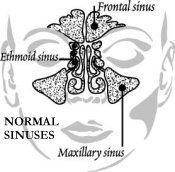 Acute rhinosinusitis is an inflammation and subsequent infection of the normally sterile sinus cavities surrounding the nose. Normally, the sinuses produce a liter of mucous per day to warm, humidify, and filter the air breathed in. When you have a cold or allergy attack, your sinuses become inflamed and are unable to drain. This can lead to stagnation of secretions and infection.
Acute rhinosinusitis is an inflammation and subsequent infection of the normally sterile sinus cavities surrounding the nose. Normally, the sinuses produce a liter of mucous per day to warm, humidify, and filter the air breathed in. When you have a cold or allergy attack, your sinuses become inflamed and are unable to drain. This can lead to stagnation of secretions and infection.
When you have frequent rhinosinusitis, or the infection lasts three months or more, it could be chronic rhinosinusitis. Symptoms of chronic rhinosinusitis may be less severe than those of acute; however, untreated chronic rhinosinusitis can cause damage to the sinuses and nasal passages that often requires surgery to repair. The infammation is really the problem. The infection is secondary and is more likely the result of rather than the cause of the problem.
The “single airway hypothesis”–that there is really only one airway from the tip of the nose to the base of the lung–is proving more and more true. We often view chronic rhinosinusitis as asthma of the sinuses (asthma as chronic rhinosinusitis of the lungs).